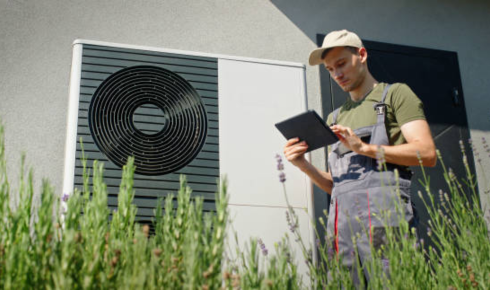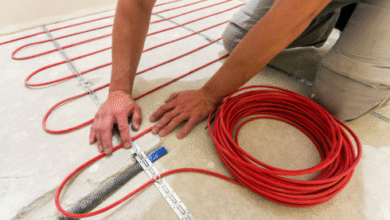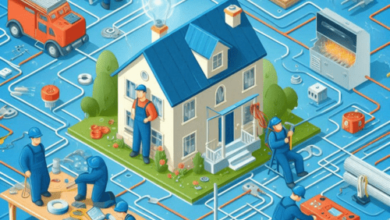Heat Pump Installation in Columbus: A Complete Guide

Heat pumps are an increasingly popular solution for year-round comfort in Columbus, Ohio. These versatile systems efficiently provide both heating and cooling, making them an excellent choice for the city’s varying climate. Whether you’re upgrading your current system or installing a heat pump in a new home, understanding the installation process and its benefits will help you make an informed decision.
Why Choose a Heat Pump for Your Home in Columbus?
Heat pumps offer several advantages over traditional HVAC systems:
Energy Efficiency – Heat pumps move heat from one place to another and in the process, use much less energy. Today’s models are engineered accordingly, and can even withstand cold climates, perfect for both winter and summer in Columbus. Visit this site for more information.
Dual Functionality – Heat pumps can heat your home in the winter and cool it in the summer, eliminating the need for separate systems.
Eco-Friendly – These systems reduce greenhouse gas emissions by using less energy and eco-friendly refrigerants, contributing to a greener environment.
Cost Savings – While the upfront installation cost may be higher, the energy savings over time can offset the expense. Many homeowners in Columbus qualify for rebates and incentives for installing energy-efficient heat pumps.
The Heat Pump Installation Process
Installing a heat pump is a complex task that requires expertise and precision. Here’s what to expect during the process:
- Assessment and Load Calculation
The expertise of a professional HVAC technician is urged to assess the area of your home, the level of insulation and configuration to ascertain the best size and type of heat pump required. Proper sizing is critical and important because if the house is small, the system may not work effectively to heat or cool the house. With oversized equipment in a small house, it may shut down and switch on too many times, wasting energy.
- System Selection
Based on the assessment, you’ll choose a heat pump that suits your needs. Options include:
- Air-Source Heat Pumps: Familiarity with them due to their cost effectiveness and an ideal solution to providing power in relatively warm climates.
- Geothermal Heat Pumps: Take advantage of the earth’s fairly constant temperature for heating and cooling the interior which is more efficient than almost any other method.
- Ductless Mini-Split Systems: Designed for those homes that do not have a duct system or where additional heating and cooling are required.
- Site Preparation
At this location, preparation works shall entail provision of adequate space for the outdoor unit and creating adequate air circulation space around the unit. Inside the buildings, it can be on the inspected or altered duct system to match the current system.
- Installation
- Outdoor Unit: The heat pump has a considerable external unit which is properly fixed on the firm and level surface of the ground. Read this for reference.
- Indoor Unit: The air handler or the indoor coil is located within your home, branching off the central ductwork system or for zoning in ductless systems.
- Refrigerant Lines and Electrical Connections: Circuits are taken through the indoor and outdoor units, and controls are wired based on the set electrical codes.
- Testing and Calibration
After installation, the system is examined to check the efficiency as well as check if it satisfies the producer’s standard. The thermostat is set and will be tested for confirmation that the heat pump will shift between the two: heating and cooling.
DIY vs. Professional Installation
While DIY projects are appealing for their cost savings, heat pump installation is not one of them. Here’s why professional installation is essential:
- Correct Sizing: Professionals use precise calculations to match the system to your home’s needs.
- Warranty Protection: Manufacturers often require professional installation to validate warranties.
- Safety: HVAC systems involve electrical work and refrigerants, which require specialized knowledge.
- Efficiency: Improper installation can lead to inefficiency, higher energy bills, and frequent repairs.
Cost of Heat Pump Installation in Columbus
The cost of heat pump installation in Columbus depends on several factors, including:
- Type of Heat Pump: Geothermal systems are more expensive upfront than air-source or mini-split systems.
- System Size: Larger systems designed for bigger homes typically cost more.
- Labor Costs: Professional installation ensures safety and quality but adds to the expense.
On average, homeowners can expect to pay between $4,000 and $12,000 for heat pump installation, with additional costs for ductwork modifications or upgrades.

Maximizing Your Investment
To get the most out of your heat pump installation:
- Choose an Experienced Installer: Look for HVAC professionals in Columbus ensuring that this company has strong reviews and certifications.
- Take Advantage of Incentives: Many energy-efficient models qualify for local, state, or federal rebates and tax credits.
- Schedule Regular Maintenance: Routine check-ups ensure your heat pump operates efficiently and lasts longer.
Conclusion
Heat pump installation in Columbus is a smart choice for homeowners seeking an energy-efficient, eco-friendly way to stay comfortable year-round. By understanding the process and benefits, you can make a confident decision that enhances your home’s value and reduces energy costs. Partner with a trusted HVAC professional to ensure a seamless installation and enjoy the long-term benefits of this modern heating and cooling solution.





